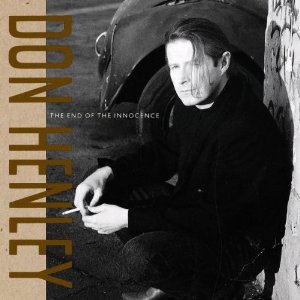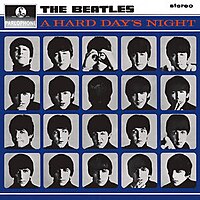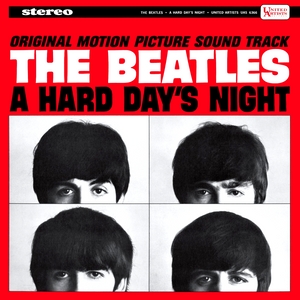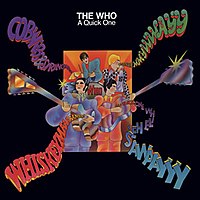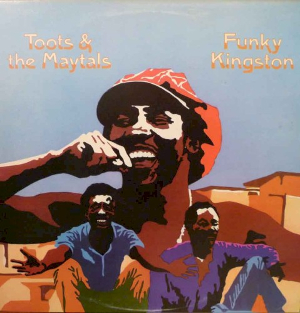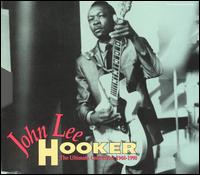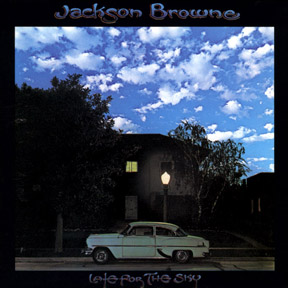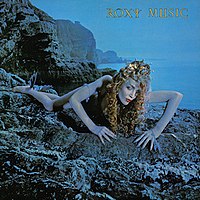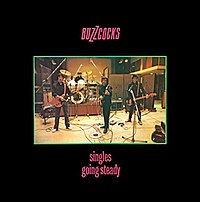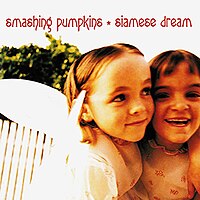 Band:
Band: The Smashing Pumpkins
Album: Siamese Dream
Why Rolling Stone gets it right: Despite being a two-man operation, "Siamese Dream" is the Smashing Pumpkins' greatest work by a mile. The song's production is tight, the guitars rage and Billy Corgan's voice is a wail of pain.
Why Rolling Stone gets it wrong: The lyrics on the record reek of self-centered nonsense and reflect, I'd say, Corgan's deplorable personality.
Best song: "Cherub Rock" is great, though the other three singles ("Today," "Disarm" and "Rocket") are all awesome. As far as non-singles go, "Soma," "Quiet" and "Spaceboy" all soar.
Worst song: I don't like "Mayonnaise," though, people enjoy it.
Is it awesome?: Unfortunately, yes.
I am a pretty disorganized person and one of my great regrets is that I've lost many of the columns I wrote in college for the MU Student News. Their online archives suck and my columns appear to have been lost in the ether.
Nevertheless, I wrote a column about superfandom that had a specific person in mind (a fellow who I knew in high school) and lambasted the idea of the "fanboy" and those who worship at the altar of certain bands.
(The irony, of course, is that I am a closet fanboy of a few bands, Death Cab for Cutie being the big one.)
I mentioned the three bands I'd experienced the most exuberant and unrelenting fandom (the wording I used, I believe, was something like "[Band] could fart into a microphone and their fans would still think it was genius.") were Tool, Radiohead and the Smashing Pumpkins.
(I would, by the way, add Nine Inch Nails to that list now.)
I don't have anything against Tool or Radiohead fans, particularly. I did hate Radiohead fans at the time because they wouldn't quit it with their love for "Kid A," though I've since come to love that album. Tool fans and I are mostly on the same page, though they bristle at the idea that Tool is a prog-rock band. Smashing Pumpkin fans, though, would always argue with me that "Melon Collie" was genius, a modern day "The Wall." They'd namedrop the Cure and Smiths, while claiming "Adore" was just an extension of '80s eyeliner rock. They'd cite Corgan's nihilistic streak as cause for "Zero" to be a generation's anthem, as opposed to what it really is: A neat guitar riff.
There's an inherent problem with SP fans and that's Billy Corgan. Most of the popular alternative rock bands of the 1990s had a pretty negative attitude towards fame; most simply wanted to make music and make a living from it. If they wanted fame or thought themselves geniuses, they kept it quiet, put on a humble face and made music. Some went to great strides to disassociate with fame (Pearl Jam and Radiohead come to mind) and some let fame destroy them (Nirvana, sadly).
Corgan, leader of Smashing Pumpkins, doesn't necessarily appear to love fame any more than a normal person, but he certainly fancies himself a genius. Being humble is not something that is in his behavior set. If he ever had a day without self-importance, I'd be hugely surprised. In his own mind, everything he says is important.
On some level, I understand the entitlement and self-centeredness. Corgan is the child of divorce (I can't totally identify with this, as my parents split when I was in college) and grew up in the Chicago suburbs (this I can certainly identify with).
The failed dreams of suburbia, however, is a concept I can identify with. It's a dangerous game as we suburban kids have been told from our first days on Earth that we could do anything we wanted. We were worshiped, coddled and treated as kings from day one, so when those things didn't come, many of us moped and complained. Many of us expected the world to hand us something that wasn't going to come.
In short, the expectation of success and affluence was our Achilles' Heel. Some of us adapted, worked hard and achieved that success. Some faced failure and overcame it. Others are bouncing around careers and post-graduate education (Hello!) in the hopes for a facsimile of the comfort we had growing up. This failure to replicate that suburban upbringing is frustrating, but a learning experience for most.
Billy Corgan, I have to think, grew up with the same encouragement. Eventually, we suburban kids realize that the world isn't our cheering section and we buck up. Many settle into a life that isn't our parents', either in mindset or in affluence.
Corgan never lost the cheering section.
(For the record, I have no idea as to what one is supposed to do to stop this suburban situation. I'm partially sure this whole rant is simply narcissism and a reflection of my own laziness and expectations of the world. This, of course, is why I should never have children.)
---
I know sports relatively well and Corgan reminds me of the wunderkind wide receiver who has never been told "no." He records all the parts on the album by himself because, damnit, he's the genius. He drinks his fans Kool Aid so much, his lips are redder than a French hooker's.
And his fans just mainline ass-kissing to him, while defending even his worse projects to non-fans (like myself). After I wrote my column about the band's fanboys, I got more e-mail than when I told bicyclists that I hate them and bloggers (irony much?) that I don't care about any of their lives.
The simple fact is this: Corgan thinks the world revolves around him. We all do, on some level, but Billy Corgan is one of the only people around who gets it reinforced by other people. When an album doesn't get critical praise, he pouts on his blog like an infant. He would refuse to go on tours with Nirvana because Kurt Cobain's wife was an ex-girlfriend (with whom Corgan would reunite after Cobain's death. Classy, Bill.). He would secretly re-record James Iha's guitar parts. He kicked, I think, three bass players, out of his band.
There are a lot of mercurial talents in rock music who are clearly jerks. I'd never want to share a meal with Steve Albini, but his music is wonderful and his polemics on the industry are great. The guys in Metallica seem like abject douchebags, but to deny the glory of their first four records would be foolish. Dave Mustaine is clearly a nutjob, but "Peace Sells" kicks all types of ass.
But, Corgan takes it a step further. He acts like a spoiled child and his fans reward him. At least there was a backlash for Metallica when Lars Ulrich decided Napster was worse than Hitler.
---
Of course, the problem is that Corgan's first mainstream success
is great. For all of
Steve Albini's comparisons to REO Speedwagon, "Siamese Dream" is a wonderful extension of alternative's rock and its move into the stadia of America. Corgan's love of Zeppelin caused him to ape Page/Plant's songwriting work while expanding on it and shortening it to fit a more space-rock aesthetic. So, instead of expanding quasi-metal odes, we get "Rocket," a popish song built around a cool rock riff. Instead of "Battle of Evermore," we get "Disarm," a vulnerable ode to rock stardom filled with strings, bells and timpani.
"Quiet" is a full-throttle rock song echoing the band's debut, while "Today" sounds almost like sugary enough to justify the band's
idiotic video. "Soma" is literate and cool, while "Spaceboy" has the acoustic feel of a, well, space rock song.
"Siamese Dream" is likely to be remembered for its opening track, "Cherub Rock." The song's lyrics -- again, showing Corgan's selfish, idiotic tendencies -- are a somewhat blunt attack on the independent music scene of Chicago at the time, telling the Albinis, McEntires and Prewitts of the world that it "Doesn't matter what you believe in" and that they're only in the scene for the money. Like a tantrum-throwing kid, Corgan's voice modulates between the softness of a child and the wail of a baby as he acts the scene's victim. Unlike Mr. Simpson and the "No Homers Club," Corgan appears to have been left out of the party is angry.
Still, as awful as it is lyrically, the song's production (Butch Vig had recently come off the success of "
Nevermind" and had worked on the band's debut, "Gish") and Corgan's meticulous guitar layering make for the band's best work. The guitar solo takes as much from the metal gods of the '80s as it does from Mick Ronson. The song starts with a drum roll, an easy riff that ends up riding up the neck up before the band explodes into the song.
It's easily the band's greatest achievement, a staggering riff, an awesome drum line and a vocal performance that fits the song's terrible, terrible anti-independent music message. Musically, though, it rocks.
---
As much as I hate to say it (again, their fans are pricks just like the band's frontman), "Siamese Dream" is wonderful.
Allmusic.com says "Siamese Dream stands alongside Nevermind and Superunknown as one of the decade's finest (and most influential) rock albums." I wish I could dispute this, but, sadly, I cannot.


